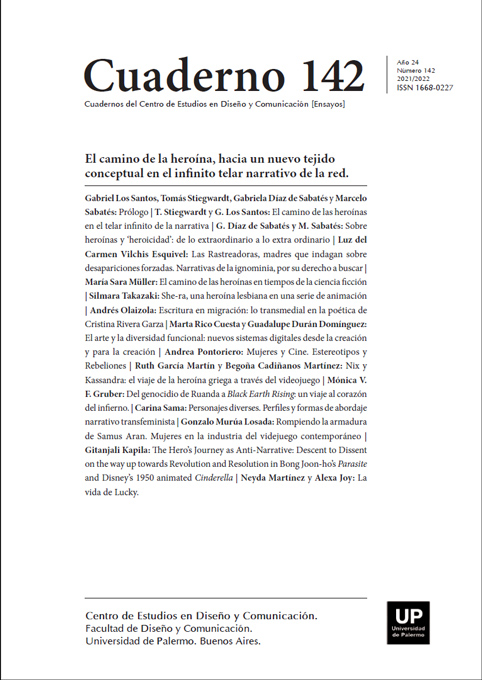Personajes diverses. Perfiles y formas de abordaje narrativo transfeminista
Abstract
We could paraphrase Steiner’s statement that what is not named does not exist, and thus propose that whichever does not identify us audio visually does not exist. If the construction of female subjectivity is built based on a patriarchal culture, where and how do trans-subjectivities enter? The audiovisual media is a way to build and diffuse subjectivities. Thus, we wonder, how can we develop a cinema that deconstructs, that opens up, allowing us to include the diversity of points of view to describe us trans-subjectivities in other ways? This article outlines a trans-feministic approach about the ways of representing it in the audiovisual world, and take us in a thoughtful journey on the representation of diverse identities from personal experiences as a documentary filmmaker. It deals particularly with the process of film-making “With Name Like a Flower” (“Con Nombre de Flor”) and also addresses the “Cartelera (Trans) feminista”, space that arises to implement other forms of distribution and exhibition for a dissident cinema.
References
Berger, J. (2010). Modos de ver. Barcelona, España: Ed. GG. SA.
Bettendorff, P. y Pérez Rial, A. (eds) (2014). Tránsitos de la mirada. Mujeres que hacen cine. Buenos Aires: Libraria.
Castillo, A. (2015). Imagen Cuerpo. Buenos Aires: Palinodia/La Cebra.
Daas, V. (2000) “The Act of Witnessing: Violence, Poisonous Knowledge and Subjectivity”, en Das, Kleinman, Ramphele y Reynolds (eds.), Violence and Subjectivity, University of California Press, Berkeley, pp. 205-226.
Ortega y Gasset, J. (2001) “Meditaciones sobre el Quijote”. Madrid. Alianza Ed. Piglia, R. (2015). Formas iniciales. Conversaciones en Princeton. Madrid: Sexto Piso.
Sama, C. (Producción y Dirección) (2019). Con nombre de flor. Argentina.
Stone, S. (1992) El Imperio Contraataca: Un Manifiesto Post-transexual. Camera Obscura. Recuperado de https://doi.org/10.1215/02705346-10-2_29-150
Valencia, S. (2010). Capitalismo Gore. Control Económico, Violencia y Narcopoder. España: Melusina.
Wayar, M. (2018). Travesti/Una teoría lo suficientemente buena. Buenos Aires: Muchas nueces.
Los autores/as que publiquen en esta revista ceden los derechos de autor y de publicación a "Cuadernos del Centro de Estudios de Diseño y Comunicación", Aceptando el registro de su trabajo bajo una licencia de atribución de Creative Commons, que permite a terceros utilizar lo publicado siempre que de el crédito pertinente a los autores y a esta revista.


